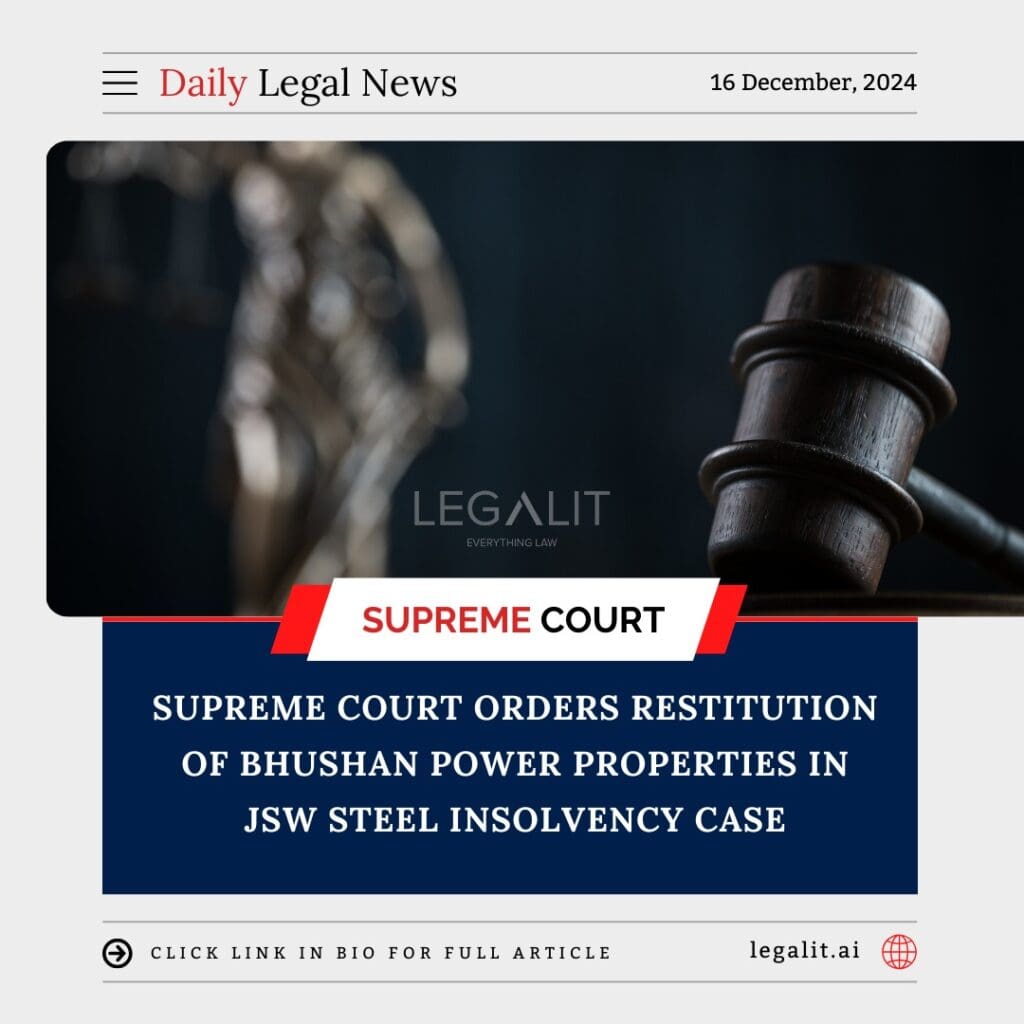
In a significant development in the Bhushan Power and Steel insolvency matter, the Supreme Court directed the Enforcement Directorate (ED) to restitute properties attached during its investigation. This decision came after the ED conceded its appeal against JSW Steel’s acquisition of Bhushan Power under the Insolvency and Bankruptcy Code (IBC). The ruling underscores the primacy of the IBC in resolving corporate insolvency cases, even in the face of overlapping investigations by other agencies.
Background:
Bhushan Power and Steel Limited (BPSL) was embroiled in insolvency proceedings under the IBC, with JSW Steel emerging as the successful resolution applicant in 2019. While the National Company Law Tribunal (NCLT) and the National Company Law Appellate Tribunal (NCLAT) approved JSW Steel’s resolution plan, the ED launched a parallel investigation into alleged money laundering involving BPSL’s former management.
In 2020, the ED attached several properties of Bhushan Power, claiming they were proceeds of crime under the Prevention of Money Laundering Act (PMLA). This move created a conflict between the IBC’s resolution framework and the PMLA’s enforcement mechanisms, leaving JSW Steel unable to take full control of the acquired assets.
JSW Steel challenged the ED’s action, arguing that the IBC provides immunity to resolution applicants from the liabilities of past management, including criminal investigations. The matter escalated to the Supreme Court, which had earlier granted interim relief to JSW Steel, restraining the ED from taking coercive action.
Court’s Rationale:
The Supreme Court emphasized the importance of finality and certainty in insolvency resolutions under the IBC. It observed that allowing agencies like the ED to attach assets post-resolution would undermine the sanctity of the process and deter prospective bidders from participating in insolvency cases.
The court reiterated that the resolution applicant, JSW Steel in this case, acquires the distressed company free from past liabilities, including those arising from alleged criminal activities of the previous management. The bench clarified that the ED’s powers under the PMLA cannot override the provisions of the IBC, particularly when it comes to the resolution and rehabilitation of companies.
The ED conceded its appeal against JSW Steel during the proceedings, paving the way for the court to order the restitution of all attached properties. The court also underscored the need for greater coordination between investigating agencies and insolvency authorities to avoid jurisdictional conflicts.
Existing Measures:
The IBC, introduced in 2016, serves as a comprehensive framework for resolving corporate insolvencies in a time-bound manner. It includes provisions to ensure that successful resolution applicants are shielded from the liabilities of the company’s past mismanagement or illegal activities.
The PMLA, on the other hand, aims to combat money laundering by attaching and confiscating proceeds of crime. This dual framework has occasionally resulted in jurisdictional overlaps, as seen in the Bhushan Power case.
To address such conflicts, recent amendments to the IBC explicitly provide immunity to resolution applicants from the consequences of past crimes committed by the insolvent company’s management. The Supreme Court’s ruling in this case reinforces the legislative intent behind these amendments.
Implications of the Ruling:
The Supreme Court’s decision has far-reaching implications for the insolvency ecosystem in India. By prioritizing the IBC framework over the PMLA in cases of corporate resolution, the judgment boosts investor confidence in the insolvency process. It ensures that resolution applicants are not held liable for the misdeeds of previous management, thus encouraging more participants in future insolvency bids.
The ruling also signals the judiciary’s commitment to maintaining the integrity and effectiveness of the IBC. It serves as a reminder to investigative agencies to align their actions with the larger goal of economic revival and corporate restructuring.
Conclusion:
The Supreme Court’s order to restitute Bhushan Power properties marks a critical victory for the IBC’s primacy in insolvency matters. By resolving the conflict between the ED’s enforcement powers and the IBC’s resolution framework, the judgment provides much-needed clarity for future cases. It reaffirms that resolution applicants like JSW Steel can acquire assets without the burden of past liabilities, fostering a more robust and investor-friendly insolvency regime in India